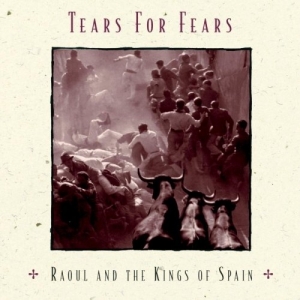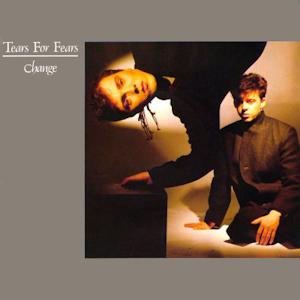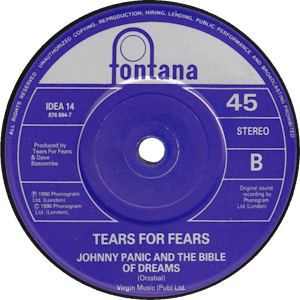
Tears for Fears are an English pop rock band formed in Bath in 1981 by Curt Smith and Roland Orzabal. Founded after the dissolution of their first band, the mod-influenced Graduate, Tears for Fears were associated with the synth-pop bands of the 1980s, and attained international chart success as part of the Second British Invasion.

The Seeds of Love is the third studio album by English pop rock band Tears for Fears, released on 25 September 1989 by Fontana Records. It retained the band's epic sound while incorporating influences ranging from jazz and soul to Beatlesque pop. Its lengthy production and scrapped recording sessions cost over £1 million. The album spawned the title hit single "Sowing the Seeds of Love", as well as "Woman in Chains", and "Advice for the Young at Heart", both of which reached the top 40 in several countries.

Elemental is the fourth studio album by English pop rock band Tears for Fears, released on 7 June 1993 by Mercury Records. It was the band's first album recorded following the departure of co-founder Curt Smith, with Roland Orzabal assuming sole leadership with the help of additional musicians.

Songs from the Big Chair is the second studio album by the English band Tears for Fears, released on 25 February 1985 by Mercury Records, distributed by Phonogram Inc. A follow-up to the band's successful debut album, The Hurting (1983), Songs from the Big Chair was a significant departure from that album's dark, introspective synth-pop, featuring a more mainstream, guitar-based pop rock sound, sophisticated production values and diverse stylistic influences, while Roland Orzabal and Ian Stanley's lyrics displayed socially and politically conscious themes.

The Hurting is the debut studio album by British new wave band Tears for Fears, released on 7 March 1983 by Mercury Records distributed by Phonogram Inc. The album peaked at No. 1 on the UK Albums Chart in its second week of release and was certified Gold by the BPI within three weeks of release. The album also entered the Top 40 in several other countries including Canada, Germany, and Australia. It was certified Platinum in the UK in January 1985.

"Everybody Wants to Rule the World" is a song by English pop rock band Tears for Fears from their second studio album Songs from the Big Chair (1985). It was written by Roland Orzabal, Ian Stanley, and Chris Hughes and produced by Hughes. It was released on 22 March 1985 by Phonogram, Mercury, and Vertigo Records as the third single from the album. "Everybody Wants to Rule the World" is a new wave and synth-pop song with lyrics that detail the desire humans have for control and power and centre on themes of corruption.

Raoul and the Kings of Spain is the fifth studio album by English pop rock band Tears for Fears, released on 16 October 1995 by Epic Records. Like the band's previous album, Elemental (1993), it is essentially a solo effort by Roland Orzabal, as neither album involved Curt Smith.

"Shout" is a song by English pop rock band Tears for Fears, released as the second single from their second studio album, Songs from the Big Chair (1985), on 23 November 1984. Roland Orzabal is the lead singer on the track, and he described it as "a simple song about protest". The single became the group's fourth top 5 hit on the UK Singles Chart, peaking at No. 4 in January 1985. In the US, it reached No. 1 on the Billboard Hot 100 on 3 August 1985 and remained there for three weeks; also topping the Cash Box chart. "Shout" became one of the most successful songs of 1985, eventually reaching No. 1 in multiple countries.

Tears Roll Down is a greatest hits album by the English pop/rock band Tears for Fears. It was released on 2 March 1992 by Fontana Records. Preceded by the single "Laid So Low ", the album contains the band's UK and international top-20 singles. It has been certified double platinum in the United Kingdom, platinum in the United States, and gold in several other countries including Canada, France and Germany.

"Head over Heels" is a song recorded by British band Tears for Fears for their second studio album Songs from the Big Chair (1985). The song was released by Mercury Records, as the album's fourth single on 14 June in the UK. It was the band's tenth single release in the United Kingdom and eighth top 40 hit in the region, peaking at number 12. In the United States, it was the third single from the album and continued the band's run of hits there, peaking at number three on the Billboard Hot 100 chart. A limited edition four-leaf-clover-shaped picture disc was issued for the single's release in the UK. The song was also an international success, reaching the top 40 in several countries.

"I Believe " is a single by the British band Tears for Fears. It was the band's eleventh single release, and as a live re-recording of a song from their second LP Songs from the Big Chair, it effectively served as that album's fifth single. It was Tears for Fears' ninth UK Top 40 hit. The song also reached the Top 10 in Ireland and peaked at No.28 in New Zealand.

"Suffer the Children" is the debut single by the British band Tears for Fears. Written and sung by Roland Orzabal and released in October 1981, it was the band's first release, recorded shortly after the break-up of Orzabal and Curt Smith's previous band Graduate. The original single was produced by David Lord and recorded at his own facility, Crescent Studios in Bath, England. The song would eventually be re-recorded for inclusion on Tears for Fears' debut LP The Hurting (1983), this time produced by Chris Hughes and Ross Cullum.

"Change" is a song by the British band Tears for Fears. Written by Roland Orzabal and sung by bassist Curt Smith, it was the band's fourth single release. It would eventually become the second hit from their debut LP The Hurting (1983) and second UK Top 5 chart hit, following the success of "Mad World". The song also gave Tears for Fears their first charting single in the United States when it cracked the Billboard Hot 100 in August 1983. "Change" was also a big international success, reaching the Top 40 in numerous countries.

"Pale Shelter" is a song by the British band Tears for Fears. Written by Roland Orzabal and sung by bassist Curt Smith, it was originally the band's second single release in early 1982. The original version of the song, entitled "Pale Shelter (You Don't Give Me Love)", did not see chart success at the time of its original UK release. However, it did later become a top 20 hit in Canada and a top 75 hit when it was reissued in the UK in 1985.

"The Way You Are" is a song by the British band Tears for Fears. It was the band's sixth single release overall and their fourth UK Top 40 hit. Released as a single in November 1983, it was intended as a stopgap between the band's first and second albums, mainly to keep the group in the public eye, and was not included on the band's second album.

"Mothers Talk" is a 1984 song by the British band Tears for Fears. Written by Roland Orzabal and Ian Stanley and sung by Orzabal, it was the band's seventh single release (the first to be taken from their second album Songs from the Big Chair and fifth UK Top 40 chart hit. The song was released six months in advance of the album, and enjoyed moderate success internationally.

"Goodnight Song" is a song by English pop rock band Tears for Fears from their 1993 album Elemental. It was released as a single in North America and in some European countries, and was a minor hit in Canada.

"Break It Down Again" is a song by English pop rock band Tears for Fears, released in May 1993 by Mercury Records as the first single from their fourth studio album, Elemental (1993). It is one of the band's later songs with the typical late 1980s sound, using synthesizers. The song was the second single released after the departure of Curt Smith from the band.

"Cold" is a song by English pop rock band Tears for Fears. Released in July 1993, it served as the second single from the band's Elemental. The single peaked at number 72 on the UK Singles Chart.

"Johnny Panic and the Bible of Dreams" is a song by the British band Tears for Fears, originally appearing as the B-side to their 1990 single "Advice for the Young at Heart" before being remixed by the techno producer/DJ band Fluke and released as a single in its own right in 1991. The remix was later included on the band's B-side compilation album Saturnine Martial & Lunatic.




















